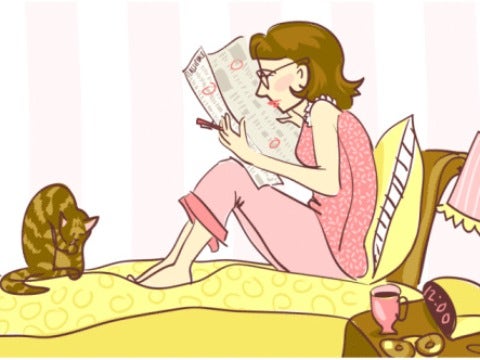Study: How Loneliness Affects Your Beauty Sleep
Lonely people experience more nighttime restlessness and disruptions in sleep.

As John Mayer once sang, "When you're dreaming with a broken heart, then waking up is the hardest part," and millions of women sighed in agreement. But when it comes to broken hearts and loneliness, waking up may actually be the easiest part, especially since you probably never got adequate sleep in the first place.
According to recent research, loneliness and feelings of isolation can keep people from getting their daily amount of z's. Lead researcher Lianne Kurina, Ph.D., an assistant professor of epidemiology at the University of Chicago, says people who are lonely tend to experience more nighttime restlessness and disruptions than their better socially adjusted peers. The study asked 95 participants how often they felt a lack of companionship, left out or isolated from their peers. Based on their responses, the men and women were rated on a standard "loneliness scale." Participants were also asked to wear a wrist device (an ActiGraph) to bed which records sleep disruption and body movement. The results: Every one-point increase on the loneliness scale resulted in an 8% increase in sleep disruption and restlessness. People Who Listen To These 3 Musicians Are Seen As Less Attractive, Says Research
Loneliness is almost always associated with relationships. Whether you're single and looking to meet that perfect match or you're in a relationship and needing some extra attention, everyone's experienced some form of isolation. My lonely nights tend to consist of bed at 9 p.m. after watching a Golden Girls marathon — no big deal. But according to the study, people who have been lonely for a long time begin to expect rejection to the point where it becomes a self-fulfilling prophecy.
Everyone has that friend who always tries to help (but fails) by stating the obvious: "Oh, just eat less, and you'll lose weight" or "Just go talk to that guy, who cares if he'll shoot you down?" The study found that telling someone who's lonely and insecure to go on more dates or just "make friends" can actually make them feel worse about themselves. What it does suggest is finding volunteer projects or common-interest groups (think book clubs and intramural sports) instead of hitting the bars. These activities can help people see their relationships in a more positive light, resulting in a more stimulating love life.
How do you combat loneliness? Do you feel that it affects your sleep patterns?

